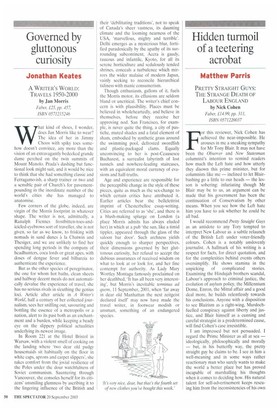Governed by gluttonous curiosity
Jonathan Keates
A WRITER'S WORLD: TRAVELS 1950-2000 by Jan Morris Faber, £25, pp. 457, ISBN 0571215246 What kind of shoes. I wonder, does Jan Morris like to wear? The idea of her in Jimmy Choos with spiky toes somehow doesn't convince, any more than the vision of an extravagantly bedecked grande dame perched on the twin summits of Mount Manolo. Prada's dashing but functional look might suit, and it would be nice to think that she had something classic and Ferragamo-ish, a sharp trainer or two and a sensible pair of Church's for pavementpounding in the inordinate number of the world's cities she has managed to anatom ise.
Few corners of the globe, indeed, are virgin of the Morris footprint in whatever shape. The writer is not, admittedly, a Ranulph Fiennes frostbitten-toes-andicicled-eyebrows sort of traveller, she is not given, so far as we know, to frisking with nomads in sand dunes a la Chatwin and Thesiger, and we are unlikely to find her spending long periods in the company of headhunters, coca lords or great apes, with doses of dengue fever and bilharzia to authenticate the experience.
But as the other species of peregrinator, the one for whom hot baths, clean sheets and halfway decent meals do not automatically devalue the experience of travel, she has no serious rivals in sleuthing the genius loci. Article after article in A Writer's World, half a century of her collected journalism, sees her sniffing out, savouring and bottling the essence of a metropolis or a nation, alert to its past both as an enchantment and a burden, while keeping a beady eye on the slippery political actualities underlying its newest image.
In Room 221 at the Hotel Bristol in Warsaw, with a violent smell of cooking on the landing where 'two dear old pudgy housemaids sit habitually on the floor in white caps, aprons and carpet slippers', she takes comfort from the jovial resilience of the Poles under the dour watchfulness of Soviet communism. Sauntering through Vancouver, she consoles herself for its citizens' unsmiling glumness by ascribing it to the lingering influence of the British and their 'debilitating traditions', not to speak of Canada's sheer vastness, its daunting climate and the looming nearness of the USA, 'marvellous, mighty and terrible'. Delhi emerges as a mysterious blur, fortified paradoxically by the apathy of its surrounding subcontinent, Accra is gaudy, raucous and infantile, Kyoto, for all its serene horticulture and sedulously tended shrines, conceals a turbulence which mirrors the wider malaise of modern Japan, vainly seeking to reconcile hierarchical tidiness with manic consumerism.
Though enthusiasm, gallons of it, fuels the Morris motor, its effusions are seldom bland or uncritical. The writer's chief concern is with plausibility. Places must be believed in wholeheartedly, and believe in themselves, before they receive her approving nod. San Francisco, for example, is never quite the thing, a city of pastiche, muted shades and a fatal element of sham, embodied by synthetic grass around the swimming pool, defrosted swordfish and plastic-packaged clams. Equally unconvincing to her is post-Ceausescu Bucharest, a surrealist labyrinth of lost tunnels and nowhere-leading staircases, with an equivalent moral currency of evasions and half-truths.
Age and experience are responsible for the perceptible change in the style of these pieces, quite as much as the sex-change to which certain critics have attributed it. Earlier articles bear the bellelettrist imprint of Chesterbelloc essay-writing. Cities are referred to as 'she', and there is a blush-making splurge on London (a place Morris admits has always eluded her) in which at a pub 'the sun, like a timid tippler, appeared through the glass of the saloon bar door'. Such archness yields quickly enough to sharper perspectives, their dimensions governed by her gluttonous curiosity, her refusal to accept the dubious assurances of received wisdom on what to look at or look for, and her fine contempt for authority. As Lady Mary Wortley Montagu famously proclaimed on her deathbed, 'It has all been very interesting', but Morris's inevitable terminus ad quern, 11 September, 2001, when 'far away in dear old Manhattan the next zeitgeist declared itself' may now have made the travel writer, in footwear modish or unsmart, something of an endangered species.


















































































 Previous page
Previous page